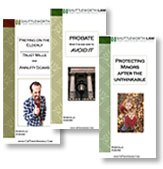THE 7 MOST COSTLY MISTAKES TO AVOID WHEN PLANNING YOUR ESTATE
There are many attorneys offering their estate planning services. How do you choose? How do you know if you are not getting more than you really need and/or being overcharged? A good attorney should provide you with an education – a complete understanding of all your options in clear, easy to understand language so you can make informed decisions. If not, find another attorney.
Here are few of the most common mistakes people make when looking for someone to prepare an estate plan on their behalf.
Costly Mistake Number 1 – Do You Really Need a Trust? A trust can be a great way to avoid probate. However, there are other ways to transfer property without probate, especially if your estate is modest and/or you own no real property (houses/land). Ask an attorney about the different ways to avoid probate other than a trust including beneficiary designations, rights of survivorship, etc. etc.
Costly Mistake Number 2 – Ask the Right Questions: Often times you will not be told some things unless you ask. Make sure you ask 1) Do I really need a trust to pass all of my property without probate? 2) What happens if I need to change my trust or will? 2) How much do you charge for changes? 3) Can you word the trust or will to allow for some likely changes (For example, additional kids or grandchildren) without the need for amendment? 4) Will you charge me if I have a simple question later about my trust? 5) Can I make some changes myself? If so, what types of changes can be made?
Costly Mistake Number 3 – Attorneys Do Not Need to Keep Your Planning Documents: Some attorneys will insist on “maintaining” or “securing” your estate planning documents on your behalf. What they are really doing is maintaining and securing their likelihood of obtaining future business when those documents become necessary because you or your loved ones are forced to contact the attorney to get the documents, typically at a time of tragedy.
Costly Mistake Number 4 – Don’t Be Charged for an Estate Planning Consult: Many attorneys will charge for an estate planning consultation if you don’t hire them to do their estate plan on the spot. This is nothing more than a way to pressure you into hiring them. Instead, when contacting an attorney, make sure you know in advance whether or not you will be charged for the consultation if you decide not to hire them.
Costly Mistake Number 5 – Overcharging for Estate Planning: If you’re like 95% of the nation, you don’t need expensive and complicated planning because you don’t have a taxable estate. Instead, you need sound and practical solutions at reasonable prices drafted by a knowledgeable attorney who will be there to guide you in the future when you have questions.
Costly Mistake Number 6 – Beware of Offers for Inexpensive Trusts Advertised in Newspapers: Newspapers often have ads for seminars touting very cheap trust packages, often under $700.00. Sounds like a good deal, right? Not really. Often times, these folks use the trust seminar as way to get you there and obtain your personal financial information. Why? Because their goal is to trick you into entering your home later to sign your “estate plan”, but then use the financial information you provided them to pressure you into buying expensive financial products you don’t need, often with huge commissions.
Costly Mistake Number 7 – Jointly Owned Property Can Be a Nightmare: One common way to avoid probate is by titling property “jointly” so that the surviving person receives the property without probate. This seems like a good idea, but can lead to disastrous results including losing your ability to sell your home, refinance your home or get a reverse mortgage, unless you get permission from the other joint owner. Perhaps more important is that if another joint tenant has a creditor, that creditor may try and collect their money by way of taking a portion of your home.
There are situations where, “rights of survivorship” are acceptable, especially between spouses, but do so only after an attorney has advised you when and how to title the property.
NOTE: This website is for general information only. No attorney-client relationship is established by the use of this website and use of this website is strictly conditioned upon the Site User Agreement.



